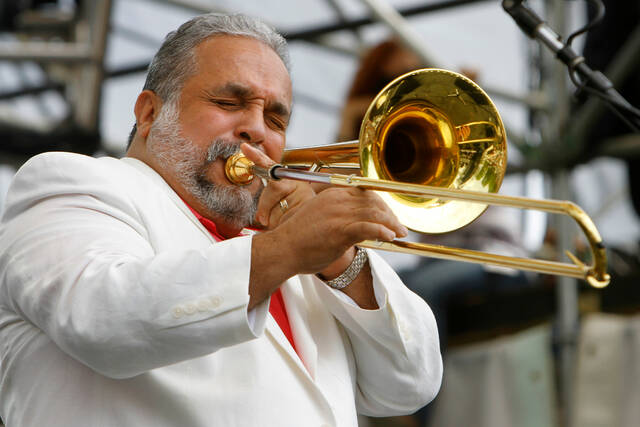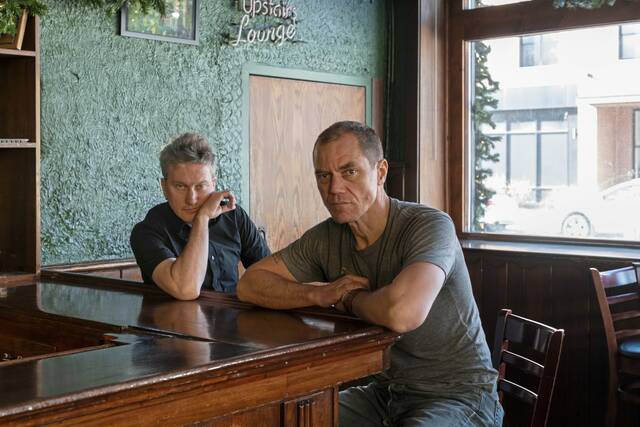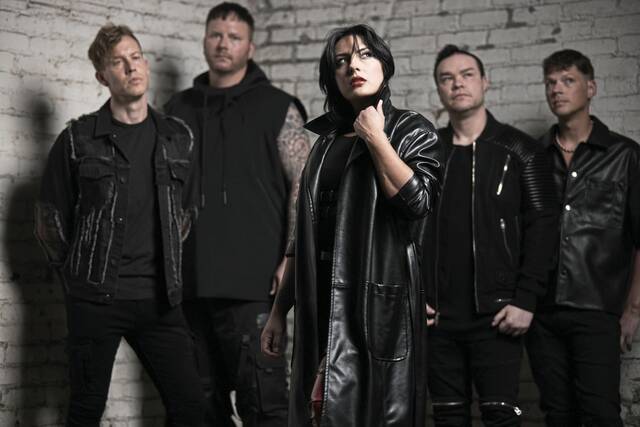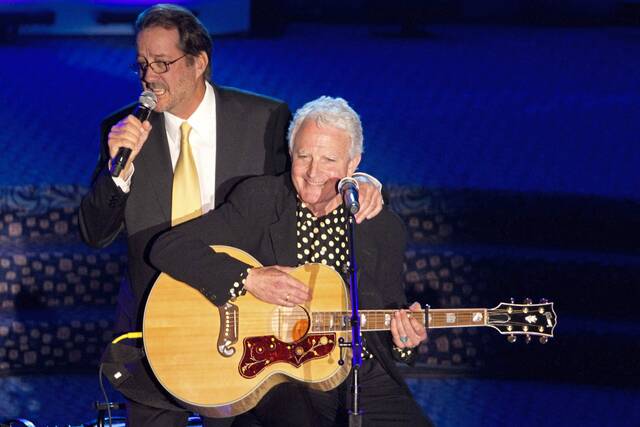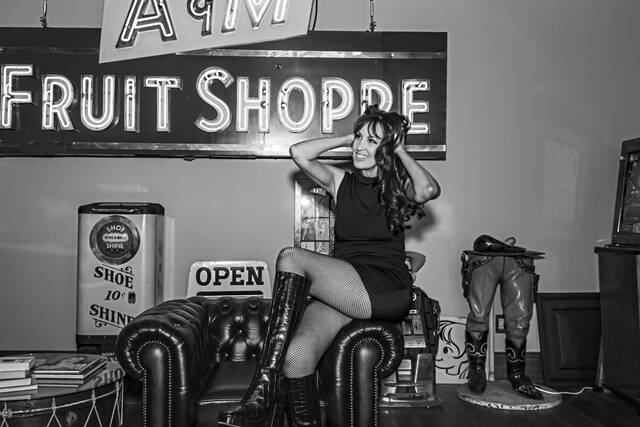Life on tour isn’t all it’s cracked up to be sometimes, as Fernanda Lira, the singer for Brazilian death metal band Crypta, can attest.
On Tuesday, an elevator issue left Lira and drummer Luana Dametto stuck in their Toronto hotel for about 30 minutes.
“Everyone thinks it’s like really about sex, drugs and rock ‘n’ roll, and it’s actually early checkouts with three hours of sleep, oil changes, gas station stops,” Lira said Tuesday during the aforementioned oil change. “The glamour is just for an hour or so.”
The all-female metal band will visit the Pittsburgh area on Oct. 6, providing support for Hatebreed’s 30th anniversary tour at the Roxian Theatre in McKees Rocks.
“I think this is the biggest tour we’ve done to date. Not only it’s an amazing, coolest lineup, but also we’re playing theaters every night,” Lira said. “And this is just a great opportunity for us to play to some people who don’t know Crypta or who are from a different scene, maybe like more of a hardcore scene and everything. This is really important for us.”
This has been a busy year for Crypta, which formed in 2019 after Lira and Dametto amicably left Nervosa, a Brazilian thrash band. With more than 100 shows in the books, and around 40 more to go this year, Lira said all the hard work is worth it, as “the climax is the stage. That is the most precious moment every night for me.”
“I think my main purpose as an artist is, of course, to use my art in order to express myself and unburden all the feelings that I carry inside me and everything,” she said. “But also get my art out there so people can maybe relate to it or feel comforted by it, or if you’re represented by it. And I think being on the road is the best way you can achieve it.”
Lira discussed the band’s brush with a tornado last year in Illinois, which left one fan dead, maintaining her voice among the nightly screaming, and what comes next:
(Answers edited for brevity and clarity)
I have to imagine that the craziest thing that happened to you on the road had to have been a tornado last year.
Yeah, honestly, I’ve been talking about this over the last days because I’ve been meeting some friends and of course everyone asks about that experience. And as I was talking to them these last few days, I was recollecting all the memories and everything. And now it feels surreal. I honestly can’t believe we’ve been through that, we survived that, and we coped with the trauma left from that. It’s honestly very surprising to me, because we don’t have tornadoes and such in Brazil. My tornado reference was that movie “Twister,” and I was terrified of it.
And I was like, well, thank God I’ll never have to go through it. And I think if you asked me to list possible stuff that could happen while touring, I would never put on that list surviving a tornado. Because I was never expecting that could happen to us. But it happened, and I can definitely say it was one of the most traumatic experiences I had to go through. Definitely the most traumatic while touring, but overall in my life, it was just too hard.
There are many details that people don’t know about it, because we don’t talk about this a lot. But there was way more than we talked about. Now I’m starting to talk about it on interviews and everything, but there are so many gruesome details. Just knowing that a fan died, it was really sad enough, but there are other details. I was calming a fan that was freaking out, and she had this huge wound on her head, and she was bleeding a lot. And then I lend her my phone, and she returned it to me, it was covered in blood. You don’t forget about these details.
And also a couple of days after that, we’ve been through a tornado warning again and then we needed to drive through the storm and there was the whole thing of the insurance not paying us, and that was very stressful. We lost a lot of money on that tour, but overall I’m very happy we survived. I’m very happy we’re still able to perform because I was afraid me and the girls would be traumatized to the point we would have panic attacks before getting on stage and stuff like that, but it didn’t happen thankfully.
But looking back what still hurts me, it’s knowing that a fan passed away. That’s the thing that still breaks my heart, knowing that someone went out there to have some fun — he was actually the only person who had bought a T-shirt from Crypta that day before the show because just wanted to support (us) — and then he died. This still saddens me a lot, but we kept on going.
Related
• Review: Slipknot brings Here Comes the Pain 25th anniversary tour to Pittsburgh• Sold-out shows from Jelly Roll, Billie Eilish, Lainey Wilson highlight Pittsburgh's top October concerts
• 2024 Pittsburgh area concert calendar
With all the shows, how much maintenance goes into keeping up your voice because, just from listening to it, you’re going all out?
I definitely have to try and keep as much as possible our routine of taking care of my voice. But I would say here on the road, what I have to do is prioritize sleeping as much as I can. So if I have like an hour in the van, I’ll prioritize sleeping for sure because sleeping literally heals your vocal cords. So that’s really, really important. I also have a humidifier where I put saline solution and then I would do that before and after the shows.
And of course, sticking to the technique I use, which is fry scream, and that can be very gentle on the vocal cords, although it doesn’t sound like, right? But I sing in a very low volume — you would be surprised — and this helps a lot maintaining quality throughout, I don’t know, almost 30 shows. … I think there’s a whole set of choices and habits that I do while I’m not on tour, just in my regular day-to-day life, that actually end up helping me a lot. I’ve been sober for a while, so not drinking helped me a lot with my vocal cords. And also I’m vegan, that reduced a lot of inflammation in my body and also in my vocal cords, less mucus, this truly helps a lot and also all the yoga so I can do my crazy backbends on stage (laughs) and taking good care of my mental health because there’s no nice performance with an unhealthy mind.
So I try and do therapy sessions every week even when I’m on tour and do meditation, stuff like that, just to keep me sane so I can deliver 100% on my performance every night.
Do you ever use that voice outside of music, like to intimidate people or to scare anybody away. Has that voice surprised people when they hear that coming from you?
(laughs) Actually, like I told you, it’s a very low voice, like low volume, I think. It would probably fail so bad if I wanted to scare (laughs) someone off the street, but people usually get really surprised, and I’m very shy about my screaming voice when I’m not on stage, like really, really shy. And usually when I’m with friends or out there having dinner or whatever, my friends end up commenting that, oh yeah, she’s a singer. And everyone is always like, oh yeah, sing a little bit for me. And I’m like, dude, you don’t really want to hear that, you know? It’s so weird. So what I end up doing is just show the music, like just put it on YouTube, then you’ll check it out. But I would probably fail on intimidating anyone just because it sounds aggressive on a microphone, but outside of that, it’s just like a squeaky mouse. (laughs)
Your album “Shades of Sorrow” has been out for about a year now, so what have you learned about the album in that time?
I really love this whole album. I have a very personal relationship with every lyric in there because it’s a very personal album. Most of the sentences you see there on the lyrics, they were in my personal diaries, so it is a very personal album. And I was wondering how it was going to be because some of the lyrics, they’re really hard, sad and tough if you get in and read them and try to see the meaning behind. I was wondering how it was going to be singing that every night because it talks about dark periods I had to go through in my life and I was wondering, when the time comes that I have to sing all these songs live, how is it gonna be? Will I get sad every night?
And then for my surprise, what I’ve learned throughout this year singing it live is that these songs, they still comfort me when I listen to them and I relate to them but from a different perspective. Whenever I sing them now, I see that I feel like well, I’m so glad I survived all this. I have a very positive approach to them nowadays because I know how I felt when I wrote them and now I’m in a completely different place mentally and emotionally and in my life per se, and it’s very nice to be able to sing them and not being attached to everything that led to them, to writing them, so it’s really interesting and comforting that I can get comforted by my own songs and just from singing then and thinking like, oh wow, man, I’m so glad I overcame all this and sometimes, like we all feel bad here and there and sometimes when I get on stage and I’m not having a good day, I can always relate to one or another song, and I’m just so thankful for being able to do that.
Reviews for “Shades of Sorrow” said that was a step-up from “Echoes of the Soul.” So what can people expect with the next album? Are you going to go even heavier next time?
I think we still haven’t started to write a new album because of 100-something shows this year. We really need a fresh mind in order to write them, and next year we’ll slow down a little bit on touring, so we can focus on writing this album. So we haven’t started yet, but I think we know already which way we want to go.
Of course, we want to keep some elements that make Crypta Crypta, but I think we definitely want to go heavier and harder on this next album. I already know the concept I want to be writing about — of course I can’t share right now — but I already know what I write about, like mental health issues and stuff like that. It’s probably gonna be a concept album and everything, but musically speaking I think it’s definitely gonna be more aggressive. Let’s put it this way: I think people will be able to headbang a little bit more with this album.
That’s what I plan. Of course, as much as you plan on whatever you want to do in an album, in the end, it ends up being very organic. You just let it flow and sometimes you have an idea when you start writing the album, but then it changes completely and it goes some other way. We’re very open to let this happen, but if everything goes according to what we want, it’s going to be a heavier one, I think.



